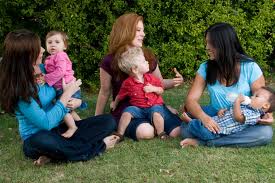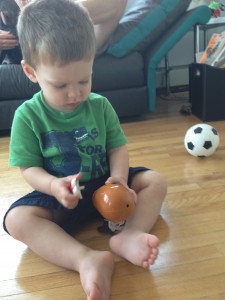 More recently, we’ve been hearing about helicopter parenting, Free-Range Kids, and the Tiger Mother. Helicopter parents are seemingly more watchful and nervous. They want to protect their children from perceived dangers and disappointments. Helicopter parents hover, so that they are always present, whether or not their child needs them. What does this teach a child? These parents often forget that teaching their children how to handle a range of situations gives them lifelong skills and increases their self-esteem.
More recently, we’ve been hearing about helicopter parenting, Free-Range Kids, and the Tiger Mother. Helicopter parents are seemingly more watchful and nervous. They want to protect their children from perceived dangers and disappointments. Helicopter parents hover, so that they are always present, whether or not their child needs them. What does this teach a child? These parents often forget that teaching their children how to handle a range of situations gives them lifelong skills and increases their self-esteem.
The creator of Free-Range Kids, Lenore Skenazy, refers to this style on her website as “common sense” parenting. Free-range parents believe in allowing their children the freedom to do things at their own pace and independently. They argue that current parenting styles are overprotective and have lost confidence in the world around them, including their own children. While I can agree that children who have more freedom to explore also tend to have well developed feelings of competency, we must also remember our children are not the only ones out there. You may trust your child, but what about other people and unforeseen obstacles that may emerge? Is the child ready to handle that?
Amy Chua, the self-titled “Tiger Mother,” believes in micromanaging children’s lives, activities and time. She chose the instrument her children would play and rejected birthday cards she deemed made with too little effort. Chua was forthcoming that this style was not without bumps and did garner some backlash from one of her daughters. That being said, I don’t know about you, but this feels a little extreme to me. Her children may have stellar grades, but what about their social skills with peers? What happens to their work ethic when mom isn’t hanging over them? Has she given her children the skills it takes to make good decisions on their own? What might her children have chosen, given the freedom to explore a wide variety of activities and materials?
 It comes down to this: which parenting style is best? The answer: There is no one style that works for all families and all children. Studies show that Authoritative parenting has the “best” results. While I agree that this more democratic and moderate style of parenting encompasses the most positive parenting attitude and technique, I also recognize that most parents allow their style to emerge organically. Choosing a little from column A, a little from column B, and the equation might shift a little bit based on a situation. For those who are set on knowing which category they fall into, online resources now offer quizzes for diagnosing your parenting style. After years of working with families and children I can tell you this, it is essential that your parenting style reflect your child’s temperament, your beliefs and your family’s needs. Throughout your child’s life, pay close attention to the information they are giving you. Even as infants, children give their parents clues into their personality and cues about what feels good for them. When you are tuned in to your child (and yourself), you can make well-informed decisions about how much freedom and responsibility your child can handle.
It comes down to this: which parenting style is best? The answer: There is no one style that works for all families and all children. Studies show that Authoritative parenting has the “best” results. While I agree that this more democratic and moderate style of parenting encompasses the most positive parenting attitude and technique, I also recognize that most parents allow their style to emerge organically. Choosing a little from column A, a little from column B, and the equation might shift a little bit based on a situation. For those who are set on knowing which category they fall into, online resources now offer quizzes for diagnosing your parenting style. After years of working with families and children I can tell you this, it is essential that your parenting style reflect your child’s temperament, your beliefs and your family’s needs. Throughout your child’s life, pay close attention to the information they are giving you. Even as infants, children give their parents clues into their personality and cues about what feels good for them. When you are tuned in to your child (and yourself), you can make well-informed decisions about how much freedom and responsibility your child can handle.
At the foundation of parenting is the responsibility to place limits when children need them and to protect them from certain realities they may not be ready to deal with. The other core component is giving children the room to experience and explore the world on their own. Sometimes that means falling down. Sometimes that means getting caught doing something wrong and having to deal with an appropriate consequence. Children, as all people, learn experientially. Parents must teach their children the skills they need to handle difficult situations, while also creating a safe haven that supports children when the going gets tough.
In the end, you can label yourself a tiger in a helicopter, or an attached free-ranger…I don’t think labels mean a thing. I’m happy to report that most parents’ primary concern is raising a happy, capable and successful-in-their-own-way, child. I believe that each family should create a unique blend of parenting styles that works for them. Most importantly, to parent effectively, you must create a strong, loving bond with your child.
(Original URL: http://www.babybites.com/03/09/what-kind-of-parent-are-you/)
